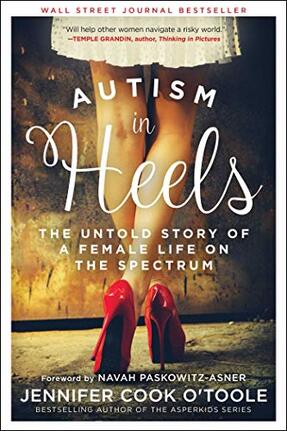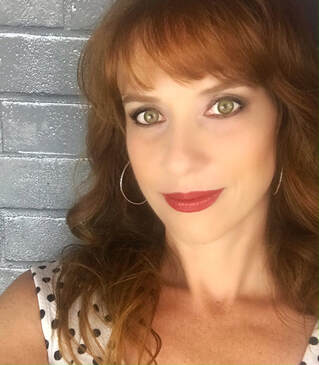Play & Book Excerpts
|
|
Autism in Heels
(Skyhorse)
© 2018 Jennifer Cook O'Toole
The Chick-List Check-List
- We tend not to act out as often as we act in. We focus the majority of our anger and frustration at ourselves. If we get in trouble, it’s much more likely for sounding like a “know-it-all” or for trouble regulating our moods.
- We can have a very difficult time navigating the complexities and nuances of female friendships, which, in comparison to male friendships, rely more acutely on storytelling (though our nonlinear thinking and easy distractibility tend to stall conversations instead of furthering them) and emotional and conversational reciprocity (though we can’t shift perspectives, unwittingly tend to dominate “air time,” and neglect to ask open-ended questions).
- Oversharing or sharing with the wrong people in the wrong circumstances is a common downfall.
- We are frequent victims of bullying and abuse, though we may not understand it as such, and tend to feel overwhelming compassion or sympathy for those who hurt us.
- Girls on the spectrum are often word/linguistically-based thinkers with a keen interest in word and phrase origins, foreign language, and regional accents - which we have an uncanny ability to imitate.
- We frequently have a strong connection to poetry and song lyrics and can detect incredibly subtle patterns within both.
- It is not uncommon to see us collecting and rescuing animals.
- Spectrum girls are more likely to gather and memorize as much information as we can on social rules, social psychology, and sexual expectations. It’s our way of compensating for what others pick up naturally.
- We tend to be socially naive, blind to others’ motives, and have a tough time clearly distinguishing between levels of a social hierarchy.
- It’s not always making friends that’s difficult. Often, it’s our tendency to be unaware of strain in the relationship and/or the sustained attention required to maintain relationships that are our downfall.
- Our friendships can be broken down into eras where close ties end abruptly, though the cause of the “break-ups” may elude us.
- We find it difficult to understand manipulation, disloyalty, vindictive or cruel behavior, and social retaliation (because we cannot see strategy or perspective).
- Throughout our lives, we often gravitate towards people who are older and/or younger than us, rather than direct peers. The relationships we prefer have clear roles and rules and less need to spontaneously negotiate dialogue, compromise, and group dynamics. In a situation where we are older, we understand that are in the teacher/leader/big sister role, so it’s alright to be more didactic. That we’re actually expected o take the wheel, so to speak. On the other hand, if we’re the younger, we can settle into an apprentice role—watching, learning, and following along.
- Girls on the spectrum may feel more intensely connected to fictional or historical characters than to real people.
- Biographies (books, documentaries, films) are a favorite way to study people and from their strategies, choices, accomplishments, and relationships, develop a larger personal emotional vocabulary and learn “how to be.”
- Hyperlexia - very early, very fast, self-taught, highly-skilled reading – is common among spectrum girls.
- Girls on the spectrum are often particularly sensitive to artistic, pattern-based mathematical realities, extending their concrete knowledge adeptly into musical cadence and visual art.
- Many girls find it very tough to clearly distinguish between levels of social hierarchy.
- We tend to be socially naive, blind to others’ motives, have trouble distinguishing acquaintances from close friends, or define what constitutes an actual friendship (we haven’t had enough experience).
- For many girls, “show-womanship” skills far exceed comfort with spontaneous or one-on-one social interaction. Intuitive use of this sidestep around social anxiety can lead to excellence in teaching, narrative presentation, litigation, and performance.
- Girls often hyper-focus on one, all-encompassing “best-friendship” (and later, romantic relationship) which evolves into an all-or-nothing self-concept. Girls desperately want friendship and easily direct an inordinate amount of energy and emotion toward someone perceived as ‘theirs.’
- Perfectionism is the all-hallowed deity (and nemesis) of the majority of spectrum girls.
- Challenges with impulsivity, problem solving, emotional balance, and compulsions make us vulnerable to substance use/abuse (alcohol/marijuana) as well as process addictions (eating disorders, self-harm, skin picking, acting out sexually, shopping, gambling), despite our awareness of the negative impact on our lives.
- Eating disorders, like binge eating, anorexia nervosa, and bulimia are indicators of perfectionist tendencies, a need for artificial control, extreme rigidity, and adherence to routine. They are exponentially more present among girls and women, and should be considered serious “red flags.”
- Females are more likely than males to try to manage anxiety, depression, trauma, and low-self esteem through self-harming behaviors, such as cutting and skin picking.
- Women and girls are more apt to find less detectable ways to limit or avoid eye contact. We may look at the space between a speaker’s eyes in order to reassure them of our attention, while simultaneously reducing our sensory input by avoiding a direct gaze, and thus be able to listen to what’s being said. If we really focus on looking at someone in a personal conversation, we may lose our train of thought almost immediately. So, when listening, we may make brief eye contact, accompany it with a nod or smile, then look off into the middle distance as if considering what we’re hearing. Personally, if I am speaking, I may angle my head so that I can cast my gaze slowly but sharply down and to the left, then ahead again, then slowly upwards to the right—very practiced theatrical techniques that are both attractive and communicate “I am thinking about what you’re saying or, extemporaneously, about what I’m saying.” In either case, because it’s done with a certain amount of “art,” until or unless it’s pointed out, most people don’t notice anything unusual about my eye contact.
- Unlike our male counterparts, it’s the level of intensity and almost professorial knowledge about our special interest, rather than the interests themselves, that set us apart from neurotypical peers.
- People on the spectrum are much more likely to experience synesthesia. Girls are three times more likely to be synesthetes.
- Scripting from favorite TV shows, books, plays, and movies is one of the ways we mask social anxiety best. We copy the dialogue perfectly, though often miss the innuendos beneath.
- Frequent passions (a.k.a. special interests) include genealogy and timelines, Disney, mythologies, folklore, cosplay, history and historical fiction, time travel, literature and literary figures, language, animals, anime, fashion, music, and theater.
- Special interests provide two primary functions: they give our brains a pleasurable topic on which to ruminate and perseverate, and they act as a social buffer, transportation to a distant time, place, species, or social scenario where interpersonal rules, hierarchies, and customs can be “studied and mastered.”
- Lining up our collections - of books, figurines, dolls, collectables - is one of the ways we “play” at all ages. The enjoyment comes more from setting precise “tableaux” - miniatures, fairy gardens, replicas, even Barbie wedding - rather than engaging in spontaneous, interactive activities.
- Gender identity varies with great obviousness amongst spectrum females. More commonly expected is some level of androgyny in clothing preference and a fluid sexual self-concept. But just as many of us greatly enjoy a rich, distinctly “womanly” sensuality, and/or strongly identify with a more classic-Hollywood female aesthetic. And most of us fall in the thousands of spaces in-between. As always, there are as many ways to embrace and embody “female” as there are people living the experience.
|
Follow Jennifer on:
|
Jennifer Cook is an award-winning author of seven bestselling books which have been translated into six languages. Her Asperkids series and her book Sisterhood of the Spectrum (Jessica Kingsley Publishers) comprise the bestselling, autism-related book collection in the world. Her memoir, Autism in Heels, is a Wall Street Journal bestseller and was chosen a "Best Book" title winner by Publishers Weekly. The recent audiobook debut of Autism in Heels (Dreamscape Media, LLC) was a number one release for Audible and Amazon, marking an important milestone as the first narration of an autism memoir by an autistic person.
In 2011, at the age of thirty-five, Jennifer Cook (then O’Toole) was diagnosed with Asperger's syndrome (autism) just after her three young children had been similarly identified. For the first time in her life, things made sense. She is a sought-after keynote speaker at large events, including the Autism Society of America’s National Conference, the USAAA World Conference, North American Montessori Teachers’ Association, The National Inclusion Project, the UK’s National Autistic Society, Ireland’s SHINE, and Denmark’s Sikon. She has spoken frequently at mega conferences alongside her colleagues (and close friends) Dr. Temple Grandin and Dr. Tony Attwood. Jennifer has advised the President's Council on Disabilities and the President's Council on Sports, Fitness, and Nutrition at the White House in 2015 and had a voice in the creation of Julia, the first autistic character on Sesame Street. She sits on the Autism Society of America’s Panel of People on the Spectrum, and she is a columnist/expert panelist for Amy Poehler’s Smart Girls at the Party. Jennifer is also a contributor to the online Spectrum Women Magazine. She sits on the Autism Society of America’s Panel of People on the Spectrum, and she is a columnist/expert panelist for Amy Poehler’s Smart Girls at the Party. Jennifer is also a contributor to the online Spectrum Women Magazine. From her own struggles and self-discovery, Jennifer’s celebrated insights have touched hearts, lightened spirits, and broadened minds around the world. |




